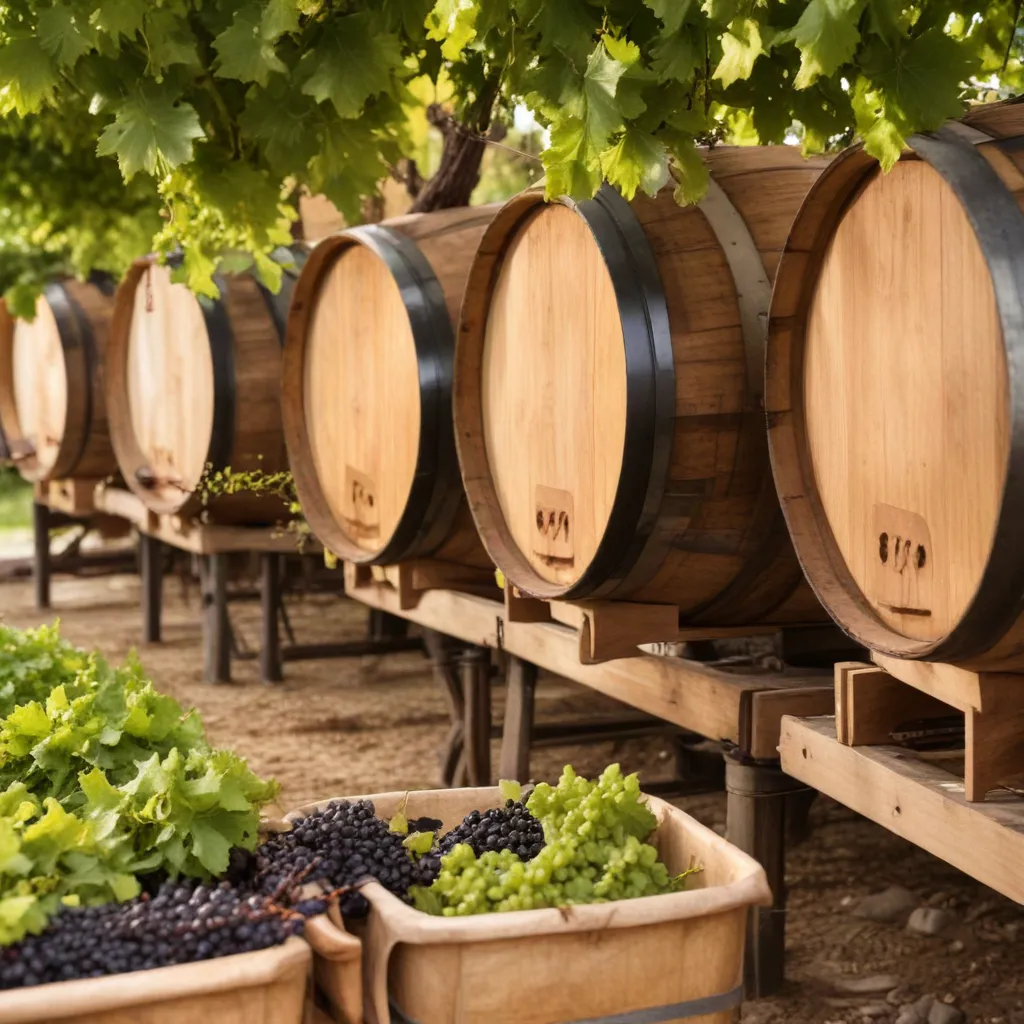
In a world where sustainability is increasingly vital, the wine industry is no exception. As stewards of the land, winemakers are acutely aware of the environmental impact of their craft. At the Wine Garden Inn, we recognize the importance of sustainable practices that not only produce exceptional wines but also operate in a manner that respects the environment, supports economic growth, and promotes social well-being.
Waste Reduction Strategies
Sustainable winemaking is a holistic approach that addresses the three pillars of sustainability: environmental stewardship, economic feasibility, and social equity. One of the key focus areas is waste reduction, which encompasses a range of eco-conscious techniques aimed at minimizing the industry’s environmental footprint.
Minimizing Grape Pomace Disposal
The byproducts of the winemaking process, such as grape pomace (the skins, seeds, and stems left after pressing), can significantly contribute to waste. However, forward-thinking wineries are finding innovative ways to repurpose this material. Trinchero Family Estates, for instance, composts more than 20,000 tons of grape pomace annually, turning this waste into a valuable nutrient-rich soil amendment.
Energy-Efficient Fermentation Processes
Winemaking is an energy-intensive process, from powering the crush pad to maintaining optimal fermentation temperatures. Wiens Cellars, a family-owned winery in Temecula, California, has implemented energy-efficient practices and renewable energy sources to minimize the winery’s environmental impact and maintain the integrity of the grapes during production.
Water Conservation Techniques
Water is a precious resource, and wineries are taking steps to reduce their consumption. Cakebread Cellars has championed water conservation efforts, including the installation of a green parking lot that allows for groundwater infiltration, reducing the strain on local water supplies.
Recycling and Repurposing Resources
Sustainable winemaking extends beyond the vineyards and into the wineries themselves, where a commitment to recycling and repurposing resources is equally important.
Upcycling Barrel and Bottle Waste
Wineries are finding creative ways to reuse materials that would otherwise end up in landfills. Trinchero Family Estates, for example, has a long-standing tradition of purchasing, washing, and reusing bottles from neighboring wineries, diverting thousands of tons of glass from waste streams each year.
Composting and Soil Enrichment
Grape pomace and other organic waste generated during the winemaking process can be transformed into nutrient-rich compost, which is then used to enrich the soil in the vineyards. This closed-loop system not only reduces waste but also enhances the health and fertility of the soil, supporting the long-term viability of the vines.
Renewable Energy Generation
Some wineries, like Wiens Cellars, are taking steps to generate their own renewable energy, reducing their reliance on fossil fuels and further minimizing their environmental impact. This can be achieved through the installation of solar panels or the utilization of biomass systems that convert organic waste into energy.
Environmental Impact Considerations
Sustainable winemaking is not just about waste reduction and resource recycling; it also involves a deep consideration of the industry’s overall environmental impact.
Carbon Footprint Management
The wine industry’s carbon footprint is largely attributed to the production and transportation of glass bottles. Wineries are exploring innovative packaging solutions, such as lightweight bottles, Tetra Pak containers, and plant-based capsules, to significantly reduce their greenhouse gas emissions.
Biodiversity Preservation
Sustainable winegrowing practices often involve measures to protect and enhance biodiversity in the vineyards. This can include the use of organic or biodynamic farming methods, the preservation of natural habitats, and the implementation of integrated pest management strategies that minimize the use of synthetic pesticides.
Organic and Biodynamic Certification
Pursuing organic or biodynamic certifications demonstrates a winery’s commitment to sustainable practices and environmental stewardship. These certifications not only ensure the use of eco-friendly farming methods but also promote a deeper understanding of the delicate balance between the vine, the soil, and the surrounding ecosystem.
Technology-Driven Innovations
Advancements in technology are playing a crucial role in the sustainable evolution of the wine industry, enabling wineries to optimize their operations and minimize their environmental impact.
Precision Viticulture Applications
Precision viticulture techniques, such as GPS-guided spraying and drip irrigation systems, allow wineries to precisely monitor and manage their vineyards, reducing water and chemical usage while enhancing crop yields and grape quality.
Automated Monitoring Systems
Automated monitoring systems, such as those employed by Wiens Cellars, provide real-time data on energy consumption, water usage, and waste management, empowering wineries to make informed decisions and continuously improve their sustainable practices.
Sustainable Packaging Solutions
Innovative packaging options, like the reusable wine growlers offered by the Wine Garden Inn, not only reduce waste but also enhance the customer experience by allowing for on-demand refills and reduced packaging footprint.
Stakeholder Engagement and Outreach
Sustainable winemaking is not just about the actions within the winery; it also involves collaborating with the broader community and educating consumers about the importance of eco-conscious choices.
Community Partnerships
Wineries are forging partnerships with local organizations, such as Adelphe in the Côtes du Rhône region, to ensure sustainable waste management and promote the adoption of eco-friendly practices throughout the wine industry.
Consumer Education Initiatives
By sharing their sustainability stories and highlighting the benefits of choosing wines from eco-conscious producers, wineries can empower consumers to make informed decisions and become active participants in the sustainable winemaking journey.
Industry Collaboration and Advocacy
Through industry associations and collaborative efforts, wineries are working together to advance sustainable practices, advocate for policy changes, and drive the wine industry towards a more environmentally responsible future.
As we raise a glass to the exceptional wines produced at the Wine Garden Inn, we also celebrate the winery’s commitment to sustainable winemaking practices. From waste reduction strategies to innovative technology applications, the Wine Garden Inn is leading the way in minimizing the environmental impact of the wine industry while delivering exceptional quality and an enriching guest experience. Cheers to a more sustainable future, one bottle at a time!
